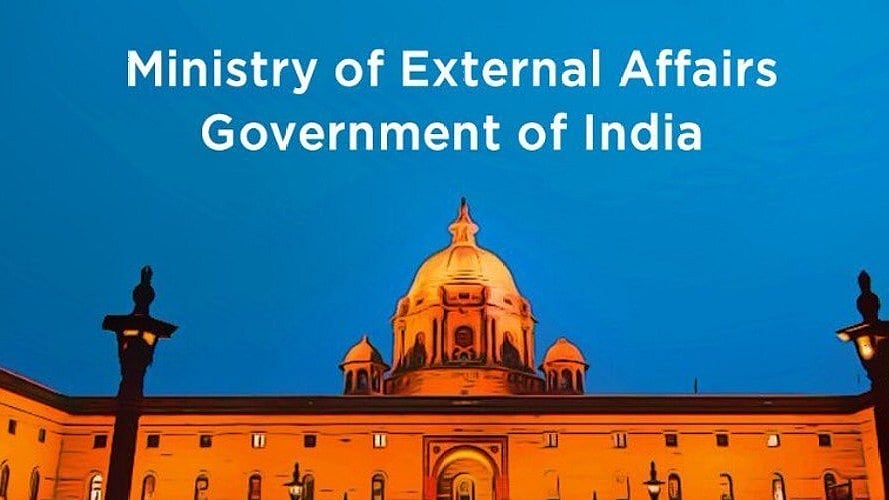
Logo of Ministry of External Affairs.
Credit: X/MEAIndia
In the context of India’s actions against the Pakistan-backed terror infrastructure, its response to Turkey and Azerbaijan – over the support the two countries extended to Pakistan during the standoff – has been naturally defiant. This response was made through a multi-track diplomacy approach that combines official, semi-official, economic, and academic channels. The conflict, marked by cross-border exchanges and drone incursions, heightened India’s security posture with a doctrine of zero-tolerance-to-terror and has led to targeted diplomatic recalibration against these two nations.
At the Track 1 level, the Ministry of External Affairs (MEA) adopted a calibrated stance by postponing ceremonial courtesies for the newly appointed Turkish Ambassador, halting high-level bilateral dialogues, and instructing Indian missions abroad to limit formal interactions with Turkish and Azerbaijani embassies. Track 1.5 diplomacy targeted economic vulnerabilities. The Directorate General of Civil Aviation (DGCA) revoked the security clearance of Turkish firm Çelebi Aviation which handled terminal and cargo operations at nine key Indian airports. Additionally, Indian carriers were advised to reduce dependency on Istanbul as a transshipment hub.
Under Track 2 diplomacy, institutions such as JNU, Jamia Millia Islamia, and IIT Bombay suspended academic and research collaborations with Turkish and Azerbaijani counterparts. Track 3 and 4 diplomacies saw major travel portals removing promotional content for both countries. Travel agencies reported large-scale cancellations. In 2024, 3.3 lakh Indians had visited Turkey, and 2.4 lakh visited Azerbaijan, together contributing over $500 million – signaling a substantial economic impact.
The Confederation of All India Traders (CAIT), representing eight crore traders, announced a boycott of Turkish apples, marbles, and consumer goods. Concurrently, industry associations called for heightened scrutiny of all imports – including chemicals and processed foods – from both nations. Moreover, Indian defense companies were advised to avoid collaboration with Turkish firms and reassess any ongoing or proposed projects.
India’s economic stakes with Turkey remain substantial, underscoring the commercial risks of any prolonged stalemate unlike in the case of Azerbaijan. In FY24, India exported goods worth US$ 6.66 billion to Turkey, led by engineering goods (US$ 2.75 billion), petroleum products, electronic goods, and chemicals – sectors deeply integrated with India’s manufacturing and export base. Simultaneously, India imported US$ 3.78 billion worth of goods from Turkey, including critical items like mineral fuels and nuclear reactor parts, reflecting Turkey’s role in supplying intermediate and strategic goods.
Investments at stake
Indian companies have invested US$ 126 million in Turkey, leveraging its customs union with the EU to access broader European markets, while Turkish investments in India exceed US$ 210 million, with active participation in India’s infrastructure and engineering sectors. Indian enterprises view Turkey as a springboard to Central Asia and the Middle East, just as Turkish firms see India as a gateway to Asia’s rising consumer and industrial markets. The entrenched commercial and investment linkages signal that both nations have much to lose should the current strain evolve into a long-term disruption.
India’s response to Turkey’s anti-India stance must go beyond mere bilateral retaliation. A triadic strategy rooted in relational intelligence, geostrategic contextualisation, and network mapping of influence offers a robust framework to counter Turkey’s growing footprint, especially in Africa. India should strengthen relations with Greece, Cyprus, and Israel, leveraging their friction with Turkey over the Eastern Mediterranean and regional influence.
India must also deepen partnerships with Armenia and Iran to counterbalance Azerbaijan.
In Africa, India should strategically counter Turkish engagement in the construction, defence, and energy sectors by offering tailored alternatives – concessional finance, trilateral development projects, and joint ventures. Recalibrating Islamic diplomacy by engaging Saudi Arabia and isolating Turkey in forums like the OIC weakens Ankara’s religious leverage. This comprehensive strategy blends realism, economic statecraft, and diplomatic agility to safeguard India’s geopolitical interests.
The focus must be on asserting strategic autonomy and countering adversaries without escalation. Countering Turkey necessitates a strategy beyond bilateral actions. Hence, rather than pursuing a confrontation, India should employ relational intelligence and strategic mapping through concessional finance, joint ventures, and targeted defence cooperation.
Simultaneously, by prioritising engagement with key Gulf countries in its Islamic diplomacy, over the Turkey-Azerbaijan-Pakistan nexus, India can undermine hostile narratives. This approach not only reinforces India’s strategic interests but also enhances its credibility as a nuanced, mature global actor capable of managing complex geopolitical challenges through calibrated, multi-dimensional statecraft.
(The writer is a professor at the Indian Institute of Foreign Trade)